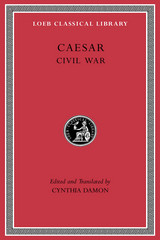
The struggle that ended the Roman Republic.
Caesar (C. Iulius, 102–44 BC), statesman and soldier, defied the dictator Sulla; served in the Mithridatic wars and in Spain; entered Roman politics as a “democrat” against the senatorial government; was the real leader of the coalition with Pompey and Crassus; conquered all Gaul for Rome; attacked Britain twice; was forced into civil war; became master of the Roman world; and achieved wide-reaching reforms until his murder. We have his books of commentarii (notes): eight on his wars in Gaul from 58–52 BC, including the two expeditions to Britain in 55–54, and three on the civil war of 49–48. They are records of his own campaigns (with occasional digressions) in vigorous, direct, clear, unemotional style and in the third person, the account of the civil war being somewhat more impassioned.
This edition of the Civil War replaces the earlier Loeb Classical Library edition by A. G. Peskett (1914) with new text, translation, introduction, and bibliography. In the Loeb Classical Library edition of Caesar, Volume I is his Gallic War; Volume III consists of Alexandrian War, African War, and Spanish War, commonly ascribed to Caesar by our manuscripts but of uncertain authorship.

In The Mask of the Parasite, Cynthia Damon maintains that the parasite of Latin literature is a negative reflection of the cliens. In Part One she assembles a composite picture of the comic parasite using as evidence fragments of Greek comedy, works from Greek writers of the imperial period whose works reflect the comic tradition, and the ten complete plays of Roman comedy in which a parasite appears. In parts two and three she examines the ways in which Cicero and the satirists use the figure of the parasite: Cicero in belittling his opponents in court, Horace and Martial in creating a negative foil for the poeta cliens, Juvenal in painting contemporary patron/client relationships as morally and spiritually bankrupt.
The Mask of the Parasite is a fascinating study of the intersection of literature and society in ancient Rome. However, neither the parasite nor patronage is confined to the Roman world. Students of classical studies as well as students of literature and cultural studies will find this to be a work of utmost importance in understanding these complex issues of human interaction.
Cynthia Damon is Assistant Professor of Classics, Amherst College
READERS
Browse our collection.
PUBLISHERS
See BiblioVault's publisher services.
STUDENT SERVICES
Files for college accessibility offices.
UChicago Accessibility Resources
home | accessibility | search | about | contact us
BiblioVault ® 2001 - 2024
The University of Chicago Press









